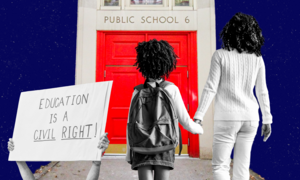5,423 Results
Helping Your Child With a Disability Get a Good Education – Louisiana
Teaching Hard History Podcast
Learning for Justice is relaunching the Teaching Hard History podcast series with host Hasan Kwame Jeffries, Ph.D., to resist current efforts to erase and alter our nation’s history.
- Teaching Hard History Podcast Series
- Slavery and the Civil War, Part 1
- Teaching Hard History: American Slavery |Key Concepts Videos
Celebrate Juneteenth With a Commitment to Disrupt the Continuum of Hard History
Learning for Justice is relaunching the Teaching Hard History podcast series with host Hasan Kwame Jeffries, Ph.D., to resist current efforts to erase and alter our nation’s history. As we celebrate Juneteenth, we uplift liberation and Black joy and culture. And we commit to learning and teaching the hard history that is foundational to the United States and the ongoing movement for freedom and equality.
- Teaching Hard History Podcast Series
- Slavery and the Civil War, Part 1
- Teaching Hard History: American Slavery |Key Concepts Videos
Teaching Hard History Podcast Season 4: The Jim Crow Era
Teaching Hard History Podcast Season 3: The Civil Rights Movement
Teaching Hard History Podcast Season 2: American Slavery
Teaching Hard History Podcast Season 1: American Slavery
School Vouchers Undermine Public Education and the Common Good
School vouchers are currently a popular topic among politicians and interest groups pushing to defund public schools and shift taxpayer funds to private for-profit or religious institutions. “By funneling public taxpayer money away from public schools, [vouchers] whittle away the ability to provide a high-quality education that is free at the point of service to all children in a community. This allows continued claims of a failing public education system. Yet, what is truly at stake is the future of a system that operates for the common good.”
- School Vouchers and the Efforts to Undermine Public Education
- Understanding How Schools Are Labeled
- Why Public Schools Matter
School Vouchers and the Efforts to Undermine Public Education
